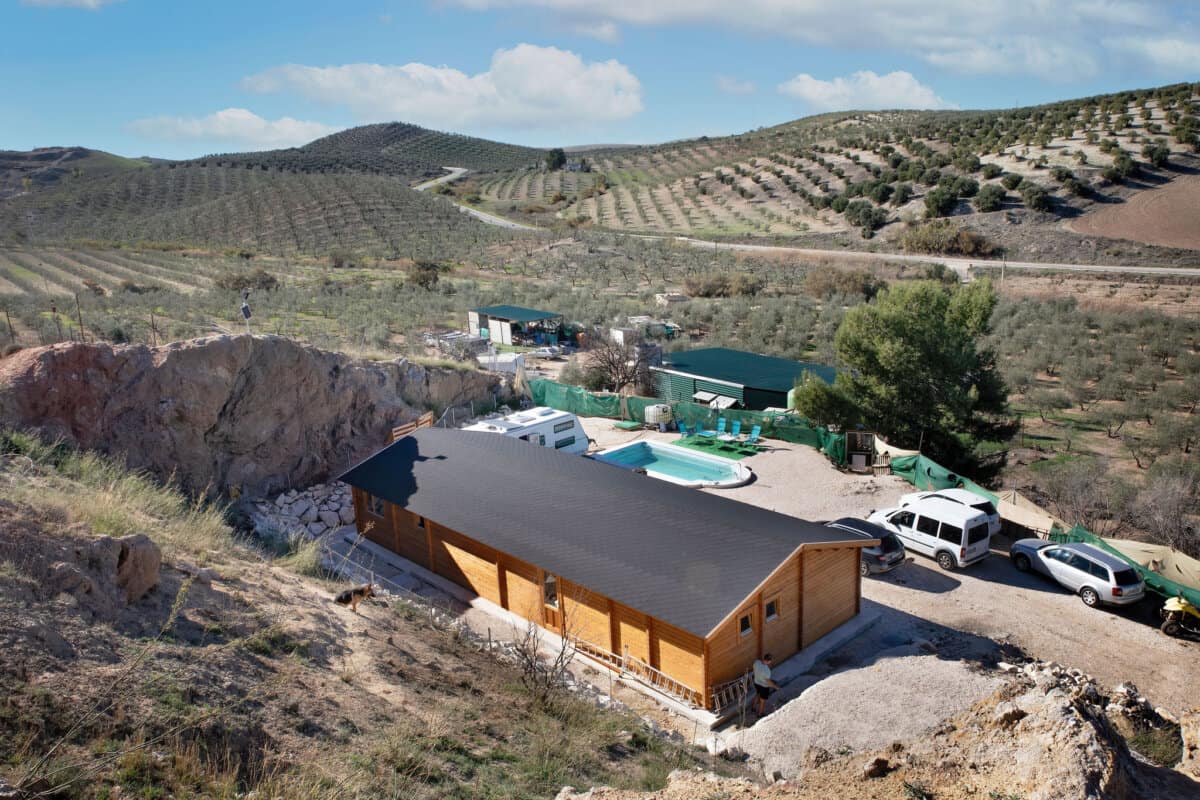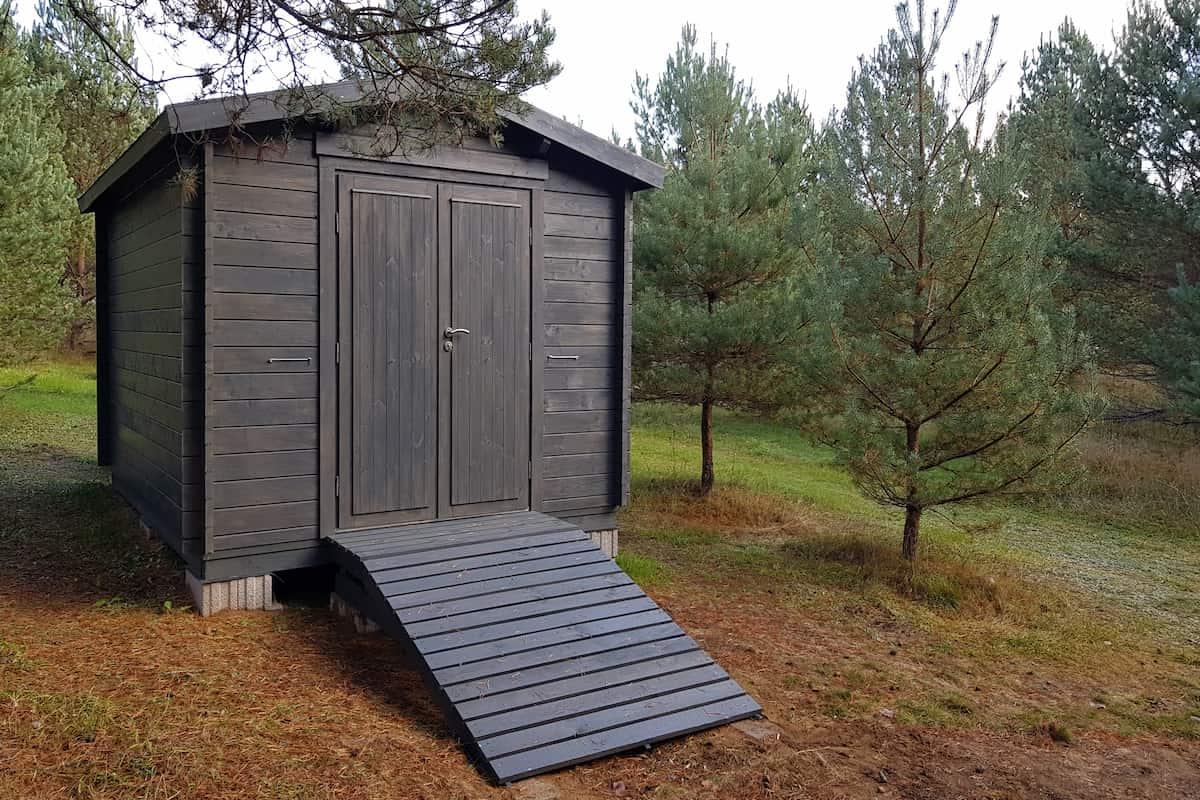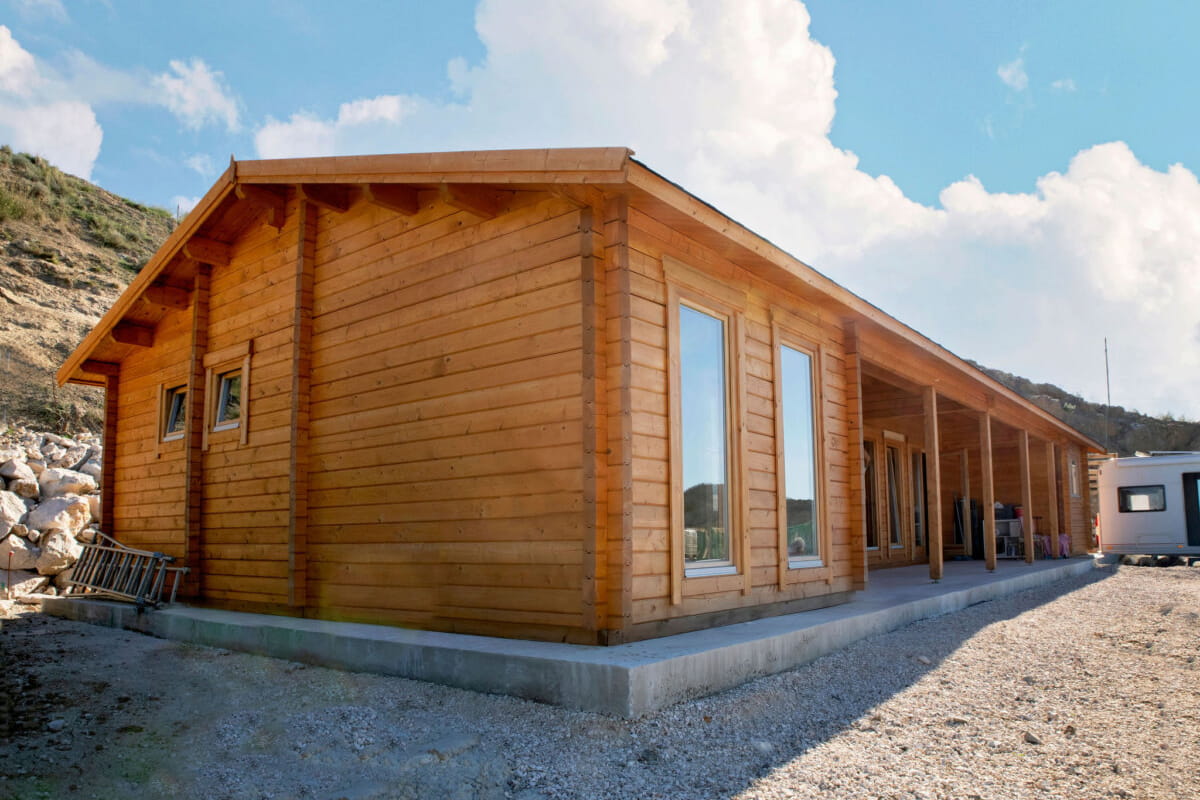Are you looking to set up your remote getaway or dream home in nature? Building a lovely wooden house on rustic land – suelo rústico or suelo no urbanizable in Spanish – can be a very attractive idea, especially if you’re a person who loves a more natural lifestyle further away from city life.
However, before you embark on your adventure, it’s important to understand the related regulations and permits. This is to avoid any legal or financial problems that can happen due to not following the right processes. In our blog post we cover everything you need to know about building on rustic land in Spain.

On the photo above: 100 m² wooden house with three bedrooms.
Rustic land, or in other words, rural land, is defined as land that is located outside the limits of urbanised or developed area. It is not meant for residential or commercial use, but rather for agricultural, livestock, forestry, hunting or any other use that is related to using natural resources.
Rural or rustic land in Spain is classified into several categories, such as:
Suelo rústico protegido: Protected rural land is dedicated to environmental preservation and has very strict restrictions.
Suelo rústico común: Ordinary rustic land allows certain constructions under specific conditions and with the right permits.
Each type of rustic land has its own rules and regulations. It is crucial to understand the differences to make sure you are acting lawfully. For example, on protected rural land, construction is severely restricted to preserve the environment. On the other hand, you can build certain constructions on ordinary rustic land as long as you have the necessary permits.
The type of constructions allowed on rural land are usually related to agricultural or livestock activities, such as building sheds for tools or stables, and not for housing. ²

In the photo above: Garden shed “Eva”.
However, under certain conditions and with the right permits, it is possible to build wooden houses on rustic land. In some cases, local municipalities allow houses to be built if they are linked to the agricultural operation of the land.
This means that if you can prove that you need to live on the land to manage the agricultural activity, you may be able to obtain permission to build a wooden house. In addition, some autonomous communities have their own additional regulations, so make sure to research the specific regulations in your region.
The requirements for building a wooden house on rural land are decided by specific regulations of each autonomous community. This is because according to the Spanish Constitution, each municipality has the right to make their own decision in land management, urban planning and housing.³
As a result of that, you’ll find differences in the requirements such as the size of the plot, the buildable area, and the height of the building, among others. For example, if you want to buy a single-family house in Murcia, the size of the land must be at least one hectare. In addition, 80% of that land must be used for cultivation and the remaining 20% can be used for building, although the construction can not exceed 300 square meters. ⁴
Another example is Castilla-La Mancha, which has similar regulations. It’s also allowed to build isolated family dwellings on rural land where there is no chance of creating new settlements, nor can it be presumed that there is an urban development purpose. ⁵
In the Autonomous Community of Cantabria, a law has been passed to authorise construction on rural land under certain restrictions, to mitigate depopulation. ⁶
It’s also important to pay attention to changes in laws. As an example, in Andalusia, the Ley de impluso para Sostenibilidad del territorio de Andalucia or LISTA (which means the law for sustainability of the land of Anadalusia) passed in 2021, initially allowing the construction of residential housing on rural land.
However, in February 2024, the Spanish Constitutional Court annulled this article, considering that it compromised the environmental protection of such land. Despite the annulment, the regional government of Andalucia has interpreted that the construction of detached single-family dwellings is still possible, as long as no new settlements are made. ⁷

Local authorities, such as town councils, are responsible for granting the necessary permits to build on rural land. Besides the local rules, the strictness may depend on the municipal architect in charge.
Generally, the first step is to hire an architect to look into the current urban planning regulations and provide advice to you as the owner. It is essential to go to the relevant town planning office to find out what documents are required. Usually, plans of the wooden building and a technical project will be required.
Once the permits have been requested, the city council will review the documents and ask for the fees, which are calculated according to the budget and the type of project. After getting your licence, you must register it in your name at a notary’s office.
Is it possible to install mobile homes on rural land?
Mobile homes offer an interesting alternative. The legality of installing a prefabricated mobile home on rural land varies according to the legislation of each autonomous community. Some territories allow the installation of these homes if they are self-sufficient, i.e. equipped with solar panels, water tanks and recycling systems. This is because they do not require building work and do not permanently alter the land.
However, this doesn’t mean you will not face sanctions if local regulations are not complied with.
To avoid problems, it is essential to consult the urban planning of the autonomous community and to get the correct information from the town hall or a professional. Although a self-sufficient mobile home may not require a building permit or affect the land, any modifications or additional construction, such as a platform for the house, may be considered a violation and lead to penalties.
Building a wooden house on rural land without obtaining the proper permits can result in severe penalties. These include fines in very high amounts – a considerable financial risk.
In addition, prison sentences ranging from 1 to 4 years may be imposed, depending on the seriousness of the offence and whether the land is classified as protected rural land or not.
This is in addition to demolition orders for illegal construction, which may also be issued. A notable example of this situation is the case of Criminal Court number two in Gijón in 2012, where a demolition order was issued for a construction carried out without the necessary permits.²
Another consideration is that illegal construction can lower the value of the land and make it difficult to sell in the future. It can also negatively affect relations with neighbours and the local community. It’s therefore very important to follow all legal procedures and obtain the necessary permits to avoid these problems.
On rural land, it is possible to build constructions related to agricultural or livestock activities, such as warehouses or stables.
Under certain conditions and with the appropriate permits, it is permitted to build dwellings, such as wooden houses, if they are justified by the need to manage an agricultural activity on the land. The specific rules depend on the autonomous community.
The minimum surface area required for the construction of a dwelling on rural land varies according to the autonomous community, but generally, the plot must be at least 2,000 m² and have access to a public road, as well as basic supplies such as electricity, water evacuation system and rubbish collection. The building cannot cover more than 20% of the total area of the plot.
In addition to these guidelines, municipalities have the flexibility to adjust regional regulations to their own circumstances. This may result in differences in buildable area or specific requirements.
Building a wooden house on rural land is possible, but it is essential to have a good understanding of the regulations and necessary permits. Always check with your local council and consider all regulations to avoid legal problems. With proper planning and by following local regulations, you can enjoy a beautiful home in a rural setting.
To make your dream a reality, consider high-quality wooden houses from Casetas de Jardin 24. We offer functional and aesthetic solutions that blend perfectly into your rustic terrain. Find out how we can help you create the perfect space for you! Contact us at 951 876 699 or info@casetasdejardin24.es
Sources: